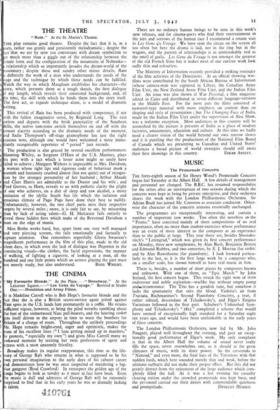MUSIC
The Promenade Concerts
THE forty-eighth season of Sir Henry Wood's Promenade Concerts began last Saturday at the Albert Hall. A few details of management and personnel are changed. The B.B.C. has resumed responsibility for the series after an interregnum of two seasons during which the concerts were kept in being by private enterprise, and their orchestra shares the work with the London Philharmonic Orchestra. Sir Adrian Boult has joined Mr. Cameron as associate conductor. Other- wise the character of the concerts remains essentially unchanged.
The programmes are exceptionally interesting, and contain a number of important new works. Too often the novelties as the "Proms." have consisted mainly of short compositions of no real importance, often no more than student-exercises whose performance was an event of more interest to the composer as an experience than to the public at large. This year there are, besides Shostako- vitch's "Leningrad," which was given its first concert performance on Monday, three new symphonies, by Alan Bush, Benjamin Britten and Edmund Rubbra, and two concertos, by E. J. Moeran (for violin) and by Alan Rawsthorne (for pianoforte). I look forward particu- larly to the last, as it is the first large work by a composer who, on a smaller scale, has shown himself to have real music in him.
There is, besides, a number of short pieces by composers known and unknown. With one of them, an "Epic March" by John Ireland, the first concert began. This struck the right note of stern endeavour and noble aspiration—warlike but without empty pomp anchscircumstance. The Trio has a goodish tune, but somehow it lacks the spontaneity that stirs the blood. Violetta's air from Traviata, Rachmaninov's Second Pianoforte Concerto, a true, if rather refined, descendant of Tchaikovsky's, and Elgar's Enigma Variations followed in the first part. Schubert's Unfinished Sym- phony and Tchaikovsky's " tfix2 " completed a scheme that would have seemed of exceptionally high standard for a Saturday night ten years ago, and would have been unthinkable in the early years of, these concerts.
The London Philharmonic Orchestra, now led by Mr. John Pougnet, played well throughout the evening, and gave an excep- tionally good performance of Elgar's work. My only complaint is that in the Albert Hall the volume of sound never really fills the space, never overwhelms one, as it should at the great climaxes of music, with its sheer power. So the crescendo in "Nimrod," and even more, the final bars of the Variations with that sudden hush, which here sounded merely thin and weak, before the ultimate outburst did not make their proper effect. But this did not greatly detract from the enjoyment of the large audience which com- pletely filled the hall. As it was a hot evening the casualty clearing station under the crowded promenade was kept busy, and- the personnel carried out their duties with commendable quietness


























 Previous page
Previous page